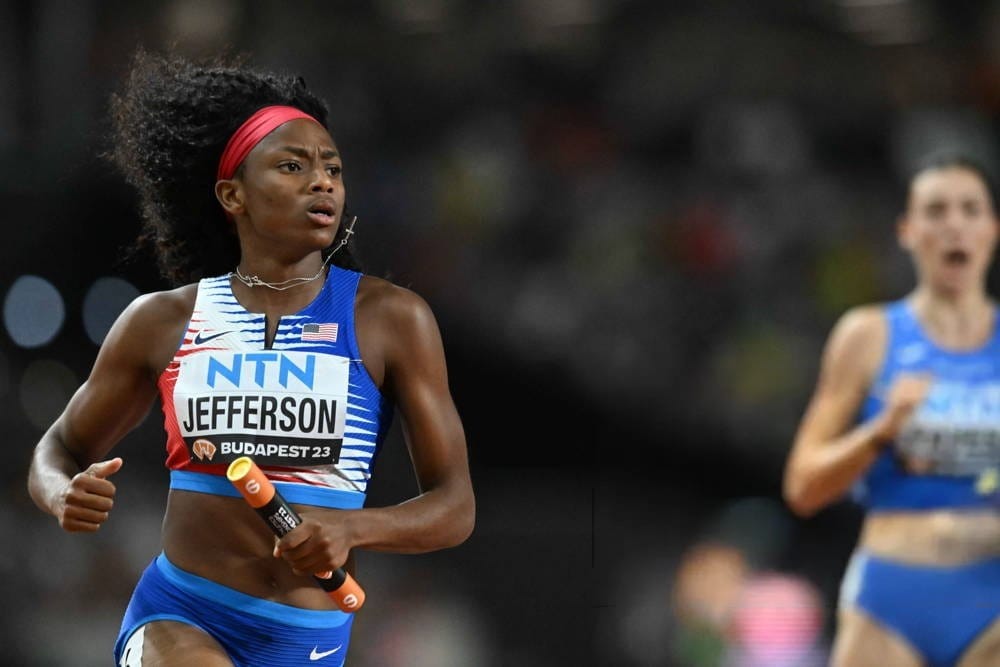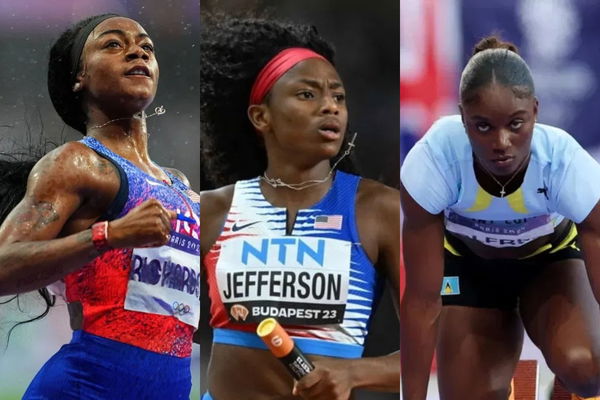
Imago
IMAGE CREDITS: IMAGO

Imago
IMAGE CREDITS: IMAGO
“I’ve been saying it all along, I want to always be remembered as one of the best in this sport.” Those were Melissa Jefferson-Wooden’s words, glowing with defiance and destiny, moments after she lit up the track in Philadelphia at Grand Slam Track. With each thunderous stride in the 200m final, Jefferson-Wooden not only crushed her personal best with a 21.99 but also delivered a statement win over Olympic champion Gabby Thomas. Just weeks after falling short against her in Miami. From a surprise double-gold performance in Kingston to this emphatic comeback in Philly, she’s pocketed $100,000. And reminded the world that she’s the one leading the charge.
Watch What’s Trending Now!
But it’s not just about her. Jefferson-Wooden knows that Grand Slam Track is doing something bigger. What makes this competition so amazing is that it brings out the best in everybody, from stars like Gabby Thomas and Sydney McLaughlin-Levrone to names you’ve never heard of until now. The first three Slams have turned into gold mines for rising stars. Dylan Beard, balancing a job at Walmart, has already won $65,000, and Jacory Patterson, who works at UPS, made $50,000 for a single second-place finish. For Jefferson-Wooden, these stories aren’t just inspiring. They’re the heart of why this platform matters.
ADVERTISEMENT
Jefferson-Wooden believes that GST’s power to change lives, not just reward the already established, is what makes the competition standout. She’s been moved by the raw, unfiltered grit of her fellow athletes, the kind of stories that rarely make headlines but deserve to. “It’s beautiful. I heard about the incident in Miami where one of the 400-metre guys worked at four in the morning loading trucks,” she shared, the admiration clear in her voice. It wasn’t just a casual mention. It was a reminder of what this sport demands when fame and fortune aren’t guaranteed. “But then he still found a way to go out there and make teams and practice.” That kind of resilience, she believes, is exactly why Grand Slam Track matters. It offers an equalizing chance.
To her, this isn’t just a competition. It’s a movement. “Grand Slam has given him an opportunity to focus on training rather than waking up to load trucks and losing sleep,” she said. Coming from someone who didn’t have a pipeline to fame either, the words hit differently. Melissa Jefferson-Wooden didn’t rise through the NCAA powerhouses in Texas or Tennessee. She stayed close to her Georgetown, South Carolina roots, and carved her own path through a small local college. Now, standing among global sprinting stars, she knows what it means to fight for a lane. “You should never be labelled a professional in a sport and not be able to provide for yourself financially,” she added, echoing the hopes of dozens of athletes for whom GST has become a lifeline, not just a platform.
ADVERTISEMENT

ADVERTISEMENT
And if her words carried power, her performance in Philadelphia roared. Jefferson-Wooden returned not just faster, but unstoppable. Just a day before her 21.99 breakthrough in the 200m, she scorched the track in 10.73 seconds in the women’s 100m. A new personal best, the world lead, and the fifth-fastest time ever by an American woman. Only nine women in history have run faster. With every meet, she’s stepping further into rare air, inching closer to sprint icons like Sha’Carri Richardson and Julien Alfred.
ADVERTISEMENT
From missed teams to medal dreams: How Melissa Jefferson-Wooden’s gamble paid off
Sha’Carri Richardson may be sprinting’s headline act, but Melissa Jefferson-Wooden has been quietly building a storyline that’s impossible to ignore. While Richardson stormed to a stunning 100m title in 2023 at the World Championships in Budapest. Clocking 10.65 seconds, Melissa didn’t even make Team USA. Instead of dwelling on that disappointment, she made a bold move: switching training camps to join Sha’Carri and Twanisha Terry under coach Dennis Mitchell in Florida. That gamble turned to gold. One year later, Jefferson-Wooden landed on the Olympic podium in Paris, finishing third behind Richardson and Julien Alfred, running a hard-earned 10.92.
But this isn’t just about medals. It’s about the climb. Melissa didn’t emerge from an elite NCAA pipeline or a well-funded system. As Coach Rob put it, she came from a “three-star circuit track background.” A far cry from the glossy start most champions are handed. Yet here she is, sprinting in rare air, defying expectations with every race. Her Olympic bronze wasn’t a fluke. It was a result of sweat equity, strategic changes, and relentless self-belief. The stats are catching up to her story too: a sub-22 200m, a 10.73 world lead in the 100m, and back-to-back wins at Grand Slam Track.
Now, the stakes are rising, and so are the predictions. “I’m not saying that she [Melissa Jefferson-Wooden] will at the USA’s,” Coach Rob teased, “but if she did, you’re gonna have to go pretty fast now, if you want to keep her off that team in that event.” And Melissa Jefferson? She’s ready for it. After years of chasing, building, and battling, she’s stepping onto the line not as an underdog, but as a contender. “So definitely excited about it,” she said. This isn’t just a comeback. It’s the emergence of a new sprint queen who’s finally running the race on her own terms.
ADVERTISEMENT
ADVERTISEMENT
ADVERTISEMENT
ADVERTISEMENT